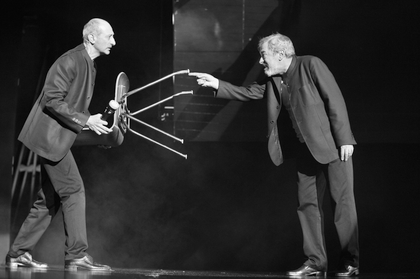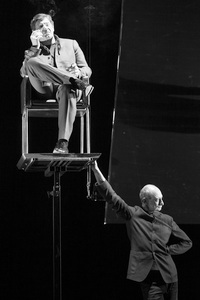
Amphitryon MolièreComedy in 3 acts Molière’s Amphitryon is an adaptation of the play by the ancient Roman playwright Plautus, which told the story of god Jupiter, who drove military commander Amphitryon almost mad, when he appeared in front of Amphitrion’s wife Alcmena in the guise of her husband, and slept with her, the result of which was the birth of future hero Hercules. Molière’s play was written at the time, when the French king Louis XIV was in the middle of his affair with Marquise de Montespan, whose husband was thrown for the time being to the Bastille, so as not to be in the way. The play was usually performed as a lilting comedy about adultery.
Molière’s Amphitryon is the first stage production done at the Fomenko Workshop Theater in collaboration with a guest foreign director. The choice of Christophe Rauck wasn’t accidental. His work was discovered by two of our theater’s leading actresses simultaneously, when in 2010 Comédie Française came to Moscow with a guest performance of Beaumarchais’ The Marriage of Figaro that was staged directed by Rauck. The actresses immediately felt that Christophe’s stage direction was remarkably similar to the signature style of Petr Fomenko. This affinity of two aesthetics allowed us to ponder possible collaboration. In the fall of 2016, the Fomenko Workshop Theater invited Christophe Rauck and his team to organize a number of workshops about the French theater. The result of this collaboration is the stage production of Amphitryon.
The stage production was created with collaboration from Théâtre du Nord (Lille), director Christophe Rauck, and with support from the Institut Français under the auspices of the French Embassy in Russia, and its director Olivier Guillaume. Project’s curator — Irina Zaitseva    The production is accompanied by Antonio Vivaldi’s Cello Concerto in G-major performed by Sergio Azzolini Opening night: January 31, 2017 Running time: 2 hours without intermission Subtitles are available in: French, Russian |
| director | Christophe Rauck | |||||||||||
| Set design | Aurélie Thomas | |||||||||||
| Costume design | Coralie Sanvoisin | |||||||||||
| Light | Olivier Oudiou | |||||||||||
| Sound | Xavier Jacquot | |||||||||||
| Translated into Russian by | Valery Bryusov | |||||||||||
| Dramaturg | Leslie Six | |||||||||||
| Assistant translator | Rimma Guenkina | |||||||||||
| Characters and Cast: | ||||||||||||
| Mercury | Ivan Verkhovykh | |||||||||||
| Night | Polina Kutepova | |||||||||||
| Jupiter in a form of Amphitryon | Vladimir Toptsov | |||||||||||
| Amphitryon Theban commander | Andrei Kazakov | |||||||||||
| Alcmene Amphitryon's wife | Ksenia Kutepova | |||||||||||
| Cleanthis Alcmene's maid, Sosie's wife | Polina Kutepova | |||||||||||
| Sosie Amphitryon's valet | Karen Badalov | |||||||||||
Theban generals
| ||||||||||||
| ||||||||||||
La Fontaine’s fable The Wolf and the Lamb translated by Ivan Krylov is read by Madlen Dzhabrailova
 |
©
Larisa Gerasimchuk |
Photo Gallery



















| © 1996—2025 «Pyotr Fomenko Workshop Theatre» fomenko@theatre.ru Boxoffice: +7 (499) 249-19-21 (from 12:00 to 21:00, without a break) Information about tickets: +7 (499) 249-17-40 (we work weekdays from 12:00 to 20:00) Fax: +7 (495) 645-33-13 Address: 121165 Moscow, Kutuzovsky prospect, 30/32 |
